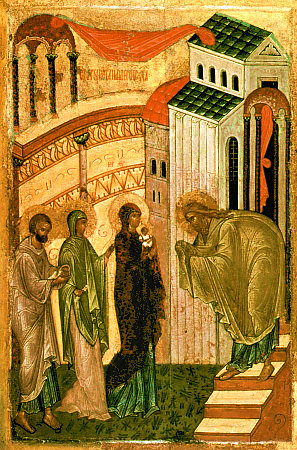Perhaps he is now 70 or 75 or even 80
years old.
Perhaps he has a long gray beard, stooped shoulders,
wrinkled face, bushy eyebrows, and trembling hands. If so, then he
knows it can’t be long. The Lord’s Christ must be coming at any moment.
Can you imagine the scene? Early every morning Simeon goes to the
Temple, watching and waiting for the Messiah to come. How would he
know him? What should he look for? Did he know to look for a baby? Or
was he looking for a teenager or a strong young man? No one knows the
answer to those questions.
Day by day he kept watch over the throngs coming into the Temple.
James Tissot The Aged Simeon
Each time a young couple came in with a baby, he whispered, “Is that
the one?” If he saw a fine looking teenager, he would say, “Is that the
one, Lord, or is it someone else?” Each day he watched, and looked,
and questioned. Each day the answer came back, time and again, “No,
that’s not the one. Keep looking. Keep watching. Keep waiting.”
Here comes Mary holding the baby in her arms with Joseph by her
side. Jesus is only forty days old. Never was there a more unlikely
couple. He is a poor carpenter from Nazareth, she is a peasant girl
carrying a little baby boy. They are obviously from the country. They
obviously don’t have much money. If you were people-watching, you
wouldn’t give them a second glance.
Not educated. Not part of the intelligentsia. Not from the
upper-crust. And here they are in cosmopolitan Jerusalem, timidly
walking onto the Temple courts. When Simeon sees them, he asks his
question for the 10,000th time, “Is this the one?” And the Holy Spirit
says, “Yes.”
"At that point Simeon breaks out into a song of praise, a song that is
so beautiful that it has come down through the centuries to us as the
final and climactic song of Christmas. The song is called the Nunc
Dimittis, the title being taken from the first two words of the Latin
translation of Simeon’s words.
What follows is first the song (vv. 29-32) and then a personal
word of prophetic blessing to Mary (vv. 34-35). The song goes like
this:
Sovereign Lord, as you have promised, now dismiss your servant in
peace. For my eyes have seen your salvation, which you have prepared in
the sight of all people, a light for revelation to the Gentiles and for
glory to your people Israel.
Simeon’s first thought is that he is now ready to die. The word
“dismiss” is a military word, used to describe a sentinel who has stood
watch during the long hours of the night. Now at last as the sun comes
up over the eastern horizon, he knows his work is done, and he goes to
his commanding officer to be dismissed. Once dismissed, he goes back to
his barracks to sleep.
That’s the way Simeon feels. The long wait is
over, the years of anticipation have been fulfilled, his sentry duty is
finished, for he has seen and personally held “the Lord’s Christ.”
Sometimes we hear stories of terminally ill patients who say,
“Doctor, I’d like to stay alive until Easter.” Then when Easter comes,
they quietly slip away. Or they say, “I’d like to stay alive until my
granddaughter gets married.” They live long enough to see her down the
aisle, and then they are gone. Doctors see it happen all the time.
Once the goal is reached, life is complete and death comes quickly.
That’s exactly how Simeon feels. He won’t live to see the Lord
grow up. He won’t witness any of the great miracles. He won’t see
Jesus walk on water, feed the 5,000 or raise the dead. Simeon will be
long gone when Jesus stands before Pilate. The crucifixion is hidden to
him, as is the resurrection. But it doesn’t matter that he won’t see
the end because Simeon has seen the beginning, and that is enough."
Anna was a prophetess, daughter of Phanuel, of the tribe of Asher,
thus a Galilean, living in Jerusalem at the time of Jesus’ birth.
“Of great age,” she must have been considerably over a
hundred years, having been a widow eighty-four years after a short
married life of seven.
Exceptionally devout and gifted in spirit, she
worshipped so constantly “with fasting and prayer night and day,”
that it is said she “did not depart from the temple.”
That her lineage is recorded indicates the distinction of
her family. Tradition says that the tribe of Asher was noted for the
beauty and talent of its women, who, for these gifts, were qualified
for royal and high-priestly marriage. While the tribe of Asher was
not among the tribes that returned from the Babylonian exile to
Palestine, many of its chief families must have done so as in the case
of the prophetess.
The period of war and national oppression through which
Anna’s early life was passed created in her, as in the aged Simeon, an
intense longing for the “redemption” promised through the Messiah.
This hope of national deliverance sustained her through more than four
decades of patient waiting. In the birth of Jesus her faith was
abundantly rewarded, and she became a grateful and ceaseless witness,
“to all who were looking for the redemption of Jerusalem,” that day of
their spiritual deliverance has come. "
Bromiley, Geoffrey W. "Anna." The International Standard
Bible Encyclopedia.
4 vols. Grand Rapids, MI: Eerdmans, 1979



























